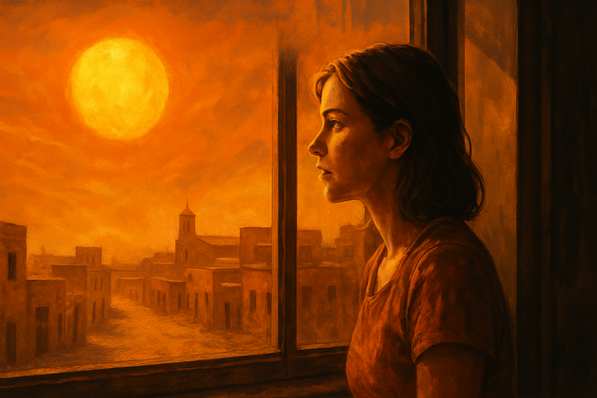This summer did not arrive — it struck.
Without warning, without mercy.
The earth felt as if it had been draped in a heavy, burning blanket that no one could pull away.
Maria sat by the window in her old house on the outskirts of Mora.
Beside her, a small fan hummed quietly, but it could no longer cool her, nor comfort her.
Outside, the tree leaves were still; even the birds had fallen silent, waiting for some unseen mercy.
The thermometer in the sun read 46.6°C.
In silence, she wiped her damp forehead.
It felt as though even her thoughts were melting.
Once, on days like this, there had been wind — the breath of the ocean, the coolness of dawn.
Now — only emptiness and heat.
The air stood still, thick and lifeless, like boiled water.
The radio repeated:
“High danger zone. Limit outdoor activity. Physical work — only at dawn or night.”
But in the countryside, that was a luxury.
The earth did not wait.
Men and women donned hats and went to work — sweating, silent, swallowed by the heat.
The house walls slowly baked, storing the wrath of the sun.
Maria’s room turned into a shadowy pocket of a sauna.
Her thoughts drifted beyond the border — to El Granado, where they said asphalt had cracked.
And farther still — to France, where hundreds of schools were closed, to Sicily, where daytime labor had been banned.
To England, where London boiled like Barbados, and the streets smelled not of blossoms, but of heat and despair.
And everywhere — the heat pressed upon people like a seal.
Not weather, but a message.
Is it punishment? Maria asked herself, quietly.
Or have we simply ignored the warnings for too long?
She stood, closed the window, and shut the wooden shutters.
The darkness inside was slightly cooler.
She sat on the edge of her bed and fell silent.
Outside, the heat continued to hum, absorbed in stone, in flesh, in the century itself.
Beyond her vision,
the earth breathed dust.
The sky — yellow-grey — held its silence, as if after an explosion.
And somewhere, just beyond the horizon,
the world smoldered.

